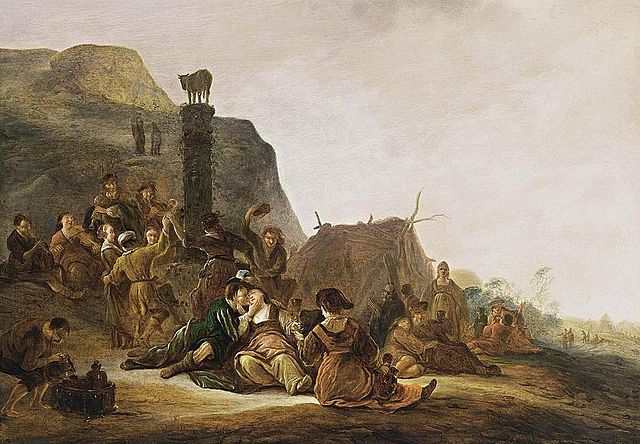The Song of the Sea is a poem that appears in the Book of Exodus of the Hebrew Bible, at Exodus 15:1–18. It is followed in verses 20 and 21 by a much shorter song sung by Miriam and the other women. The Song of the Sea was reputedly sung by the Israelites after their crossing the Red Sea in safety, and celebrates their freedom after generations of slavery and oppression by the Egyptians.
The Songs of Joy (watercolor circa 1896–1902 by James Tissot)
Song of the Sea from a Sefer Torah
An engraving of a Torah scroll showing Exodus 15:1–19. British Library Add. MS. 4,707 (1896).
The Book of Exodus is the second book of the Bible. It is a narrative of the Exodus, the origin myth of the Israelites leaving slavery in Biblical Egypt through the strength of their deity named Yahweh, who according to the story chose them as his people. The Israelites then journey with the legendary prophet Moses to Mount Sinai, where Yahweh gives the 10 commandments and they enter into a covenant with Yahweh, who promises to make them a "holy nation, and a kingdom of priests" on condition of their faithfulness. He gives them their laws and instructions to build the Tabernacle, the means by which he will come from heaven and dwell with them and lead them in a holy war to conquer Canaan, which has earlier, according to the myth of Genesis, been promised to the "seed" of Abraham, the legendary patriarch of the Israelites.
Papyrus Oxyrhynchus 1075, a 3rd or 4th century CE manuscript showing part of Exodus 40
Finding of Moses in the Dura-Europos synagogue, c. 244
Geography of the Book of Exodus, with the Nile River and its delta, left, the Red Sea and Sinai desert, center, and the land of Israel, upper right
Worship of the Golden Calf, Gerrit de Wet, 17th century







